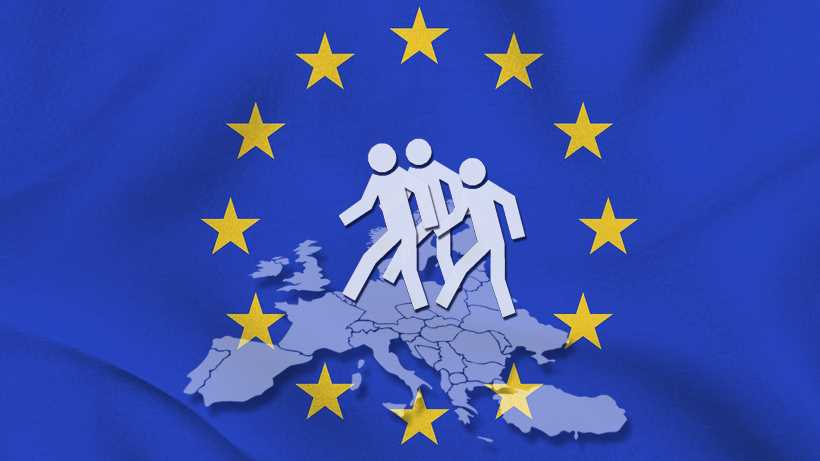
Is freedom of movement in the EU a good reason for a EU exit? Is free movement of Europeans bad for Britain? Join our debate and vote in our poll (see below)
Debate speakers
For freedom of movement and EU membership:
- Lisi Freeman Alarcon is the Academic Student Representative and Secretary General of the Mansfield Law Society at London Metropolitan University. Lisi has lived in different countries in Europe, Asia and Africa and Speaks English, Spanish, French and Arabic. Lisi is a member of the New Europeans.
- Bright Amponsah is a teacher who has been working in Further and Higher Education. He was involved in the Scottish Parliament's Community Partnership Project and presented the report "Social Integration and Cultural Exchange". He speaks English and Italian and is also member of New Europeans.
Against freedom of movement and EU membership:
- Daniel Oxley is the treasurer of the London Borough of Newham UKIP branch and stood as UKIP candidate for the parliamentary constituency of East Ham. He is a long serving school governor and has had been directly involved in curriculum development. He currently works in tourism, specializing in cultural travel involving opera, concerts and ballet.
- Phil Sheppard studies History at the London School of Economics and Political Science. He is a member of the Conservative Party and Chair of London Universities for Britain, a group supporting the "Vote Leave" option in the Brexit referendum. Phil is born to a British father and a Russian mother and speaks English, Russian and French.
EU freedom of movement
The pros and cons of being in the EU are currently being discussed daily in the UK. The referendum on European membership has brought to the fore a myriad of arguments in favour and against EU membership. The free movement of persons is one of the four founding principles of the European Union alongside the free movement of goods, services and capital. However, the EU freedom of movement principle has come under close scrutiny in the context of the current refugee and migrants crisis and of the growing popularity of the United Kingdom Independence Party. Bordering policies are key in political debates.
The Eurozone crisis and the alleged marginalization of Britain by EU decision-making bodies have become regular arguments in the Brexit debate. In the wake of the wave of terrorist attacks in France and Belgium, many have claimed that it is time to "take back control of the UK's borders." For them, the Home Office should have the last word in deciding who can come, live and work in the UK or who should not. British jobs and security are at stake at the moment and the principle of national sovereignty over the territory should prevail. There are also concerns on the integration of immigrants and their impact on local culture and socio-demographic landscape. Often those against free movement of workers have taken a stance against EU membership and are supporting the "Leave EU" campaign.
On the other hand, many argue that, precisely, the UK is the country that has benefitted the most from the free movement of workers in the EU. Britain has managed to develop a service economy grounded on the talent coming from all over Europe and beyond. The new increased diversity in Britain is the result of its open labour market driven growth over the last decades. The lack of bureaucratic barriers has served to attract the brightst and best. These "migrants" from other EU countries are disproportionally well-educated and skilled and cultural diversity has made the UK a more interesting destination. The UK is already a non-Schengen country and security would be hindered if police collaboration with the EU would diminish. Exiting the EU or introducing new bureaucratic barriers or visa requirements for EU citizens would likely make Britain less appealing to multinational companies and start-ups. Moreover, it will also create difficulties for the more than 1.3 million British citizens currently living in other European countries.
What do you think? Should Britain leave the EU? Is free movement of persons in the EU really a problem? Should border control and restricting migration be a priority for the UK government? What about free movement of goods, services and capital? Join the debate, leave your comments and questions you did not have the chance to ask during the event below.
Check out these videos with Professor Simon Hix, Department of Government, London School of Economics, and Professor Catherine Barnard, Faculty of Law, University of Cambridge
If you want to promote your own scholarly debate, lecture, research project or academic article, contact us: university[a]netivist.org
If you change your mind, you can change your vote simply by clicking on another option.
New to netivist?
Join with confidence, netivist is completely advertisement free. You will not receive any promotional materials from third parties.
Join the debate
In order to join the debate you must be logged in.
Already have an account on netivist? Just login. New to netivist? Create your account for free.
You are viewing a filtered list of comments. Click the button above to view all comments.
Those are indeed two of the many points being raised in opposition to free and unchecked movement, bravo. They aren't the only ones but they are important.
I'm hearing that even neutral people on this issue are questioning whether your solution (coordination) is real; EU effectiveness and bureaucracy is the main reason the people who wish to leave are saying we should leave and it is increasingly true that the unaccountable and overblown EU vehicles have very little to recommend them in terms of effectiveness or efficiency.
I've even heard it said that the UK should be deliberate in what they choose to do now; leave as a protest about the worsening EU governance performance thus avoiding culpability for the deteriorating situation the public faces. Watch while it implodes over the next 10 years under increasing public disenchantment and then rejoin its successor when that is organised and gathers sufficient public trust. The argument here is that reformation is not possible any longer so the only hope for any change in EU operations is complete destruction and rebuilding in a different form. Not a pleasant prospect I'll grant you but possibly the only one with a chance of achieving the end-game result.
I also think that exiting the EU would be a great mistake, but I understand why some people are afraid by "free movement". Actually sometimes people in the left are concerned that this is part of a kind of elitist version of cosmopolitanism where the rich can move anywhere they want (and bring their fortunes along) and the poor have little say or opportunities. I also see why some people are afraid for security reasons that violent criminals and terrorists can cross the borders. Some EU countries such as Belgium have demonstrated tremendous issues in dealing properly with terrorism and their poor job could compromise the security of other countries. Again, I believe that the solution is not creating barriers within Europe but to enhance coordination in terms of security and even education and labour market so the demand and offer in countries is more balanced and migration flows are moderate.
Join the debate
In order to join the debate you must be logged in.
Already have an account on netivist? Just login. New to netivist? Create your account for free.


















